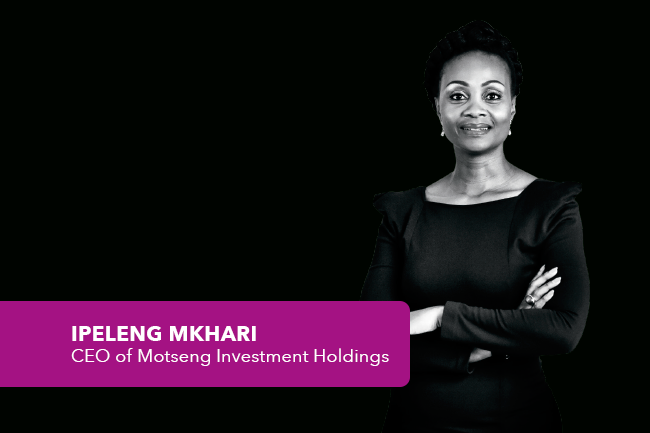She has been described as ‘bold, brave and brilliant’ – a self-made woman, who has made it big in business though ‘grit, sweat and some clever decisions’. Ipeleng Mkhari, group CEO and co-founder of Motseng Investment Holdings, is all that and much more. By her own admission, she ‘stumbled’ into entrepreneurship, fresh out of varsity in 1997, and without any pre-conceived career path in mind. ‘I studied a BA in social sciences at the University of Natal and never intended to become a property practitioner or investor,’ says Mkhari.
This all changed once she started working as marketing manager in a small closed-circuit television (CCTV) company, which opened up new business opportunities. It provided the direction for her single-minded entrepreneurial journey that went from the security surveillance industry straight up the property business value chain. Today she’s at the very top of the corporate ladder, in charge of Motseng Investment Holdings, a successful multidisciplinary, black-owned property investment group that managers ZAR20 billion in third-party assets and some company assets.
In addition to being CEO of her own company, Mkhari wears many other hats. She’s president of the South African Property Owners’ Association and serves as non-executive director on numerous boards, including Nampak, KAP Industrial and Attacq.
‘I’m proud of the fact that Motseng is a diversified Southern African business that is active in three geographies – South Africa, Mozambique and Lesotho – and in the early stages of expanding into two more countries, Botswana and Zimbabwe.
‘We see the Southern Africa region as a great opportunity to extend our partnerships and skills development,’ she says. ‘Our strategy involves finding leading local partners that already have a strong market position and attractive growth prospects. We then grow and support them in their respective countries.’
This approach has worked well for the company. Since its small beginnings in 1998, Motseng Investment has progressively evolved into a large holding group that currently employs nearly 300 people across the Southern Africa region.
The group is invested in a portfolio of listed companies that spans a variety of sectors, including infrastructure, property-related diversified industrials, transport, services and telecoms. The key holdings continue to be in the property sector.
Mkhari recounts the story of her early days, when she founded South Africa’s first black-woman owned and managed CCTV company at the age of 23. She had left her first employment after realising that the small family-owned CCTV business was involved in BEE fronting. ‘Six months into my appointment, I found out that my “co-directors” were actually the gardener and housekeeper. My integrity was too important, so I started my own business.
‘Motseng Investment was born shortly afterwards, initially as a security business. It was a scary and challenging time but also exceptionally optimistic. We went from offering physical security and cleaning services to becoming property managers, then facility managers, to eventually landlords and investors.
‘Our focus is now on property development, property acquisition, as well as managing property,’ according to Mkhari, who describes herself as very involved in the business.
‘I’ve always been in the thick of things, driving the conversation,’ she says. ‘As group CEO I have weekly meetings with my exco. And although my management team deals with the day-to-day operations, I always know what’s going on and sometimes step in to make decisions.’
Her rise to the top has involved sacrifices and far less glamour than people expect. ‘Starting a business is not as easy as it may seem. It looks sexy from afar: the shining lights, magazine covers and awards. But after 20 years in the business I can honestly say it’s a lot of hard work. Starting from zero, you work without salary, lose opportunities, thicken your skin, learn from failure, build resilience and teach yourself as you go along.’
To give back some of her knowledge, Mkhari mentors four young women. Furthermore, 70% of her executive team are black women, and not only South African but also Mozambican, Basotho and Zimbabwean – a reflection of the firm’s regional footprint. The empowerment of women and young black professionals in general is close to her heart, she says.
‘It gives me a higher purpose to see my community being exposed to a business sector they may not be familiar with, and assist them to develop and grow within this sector. That keeps me going.’



